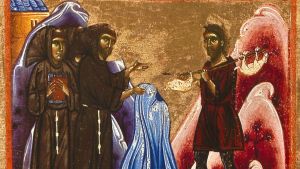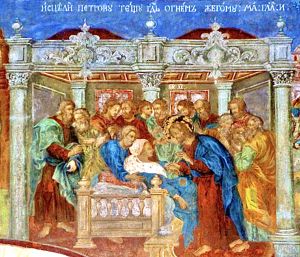
Teresa Girolami
Teresa Girolami è laureata in Materie letterarie e Teologia. Ha pubblicato vari testi, fra cui: "Pellegrinaggio del cuore" (Ed. Piemme); "I Fiammiferi di Maria - La Madre di Dio in prosa e poesia"; "Tenerezza Scalza - Natura di donna"; co-autrice di "Dialogo e Solstizio".
Precarious dimension, shared humanity
In today's Gospel Jesus, surrounded by a large crowd, heals many, and the unclean spirits call him by his Name: "You are the Son of God".
(Mk 3:11).
The Sources tell us that Francis, in his Letter to the whole Order, expresses himself thus:
«Brother Francis, a small and frail man, your little servant, wishes health in Him who has redeemed us and washed us in His most precious blood.
Hearing His name, adore Him with fear and reverence, leaning towards the earth: Lord Jesus Christ, Son of the Most High is His name, blessed for ever» (FF 215).
The Poverello always presents Jesus as the One who has nowhere to stand. In fact, even in today's passage, Christ, because of the crowd, asks the disciples to keep a boat ready for him so that he will not be crushed.
Jesus shows the precarious dimension of his living in all circumstances.
In love with poverty, Francis addresses his brothers with the expression from the Gospel:
«The foxes have their dens and the birds of the air have their nests; but the Son of Man has nowhere to lay his head [...]».
"[Thus] he taught the brothers to build poor huts [...] to live in them not as their own houses, but as in the houses of others, as pilgrims and strangers.
He said that the code of pilgrims is this:
«To gather under the roofs of others, to thirst for the homeland, to pass away in peace»" (FF1120).
And since he repeated that children of God are those who do his works, the Minim of Assisi distinguished himself as a child of God, and in the Spirit he performed many healings.
"People of all ages and sexes ran to see and hear that new man, given from heaven to the world.
He pilgrimaged through the various regions, fervently proclaiming the Gospel; and the Lord cooperated, confirming the Word with the miracles that accompanied it.
Indeed, in the name of the Lord, Francis, preacher of the truth, drove out demons, healed the sick, and, an even greater miracle, by the efficacy of his word he softened and moved the obstinate to penance and, at the same time, restored health to bodies and hearts" (FF 1212).
«For he cured many so that they rushed to him to touch him, as many as had infirmities» (Mk 3:10)
Thursday, 2nd wk. in O.T. (Mk 3:7-12)
Observance and Person
Today's Gospel highlights the hardness of heart of the Pharisees who were ready to accuse Jesus for healing a paralysed hand.
For them, observance comes before the person. And that is terrifying!
Francis, the Little One of Assisi, on the other hand, in the footsteps of Christ, put human health, both physical and inner, at the centre.
For him, the brother (or sister) to be healed came before all criteria.
Announcing salvation and implementing it was the first reason that governs the universe, and for this he was ready for anything.
In the Sources we find life stories that draw attention to Francis' compassion for those waiting to be healed.
"A little girl from Gubbio with shrunken hands had already lost the use of all her limbs for a year. The nurse, confident that she would be cured, took her to the tomb of St Francis, bringing with her a wax figure the size of the child*.
After eight days of waiting, the miracle comes true: the little infirm girl recovers the use of her limbs, so that she is deemed fit for her former chores" (FF 549).
"A woman from the town of Gubbio had both her hands shrunken and dry, so that she could not use them at all. As soon as the Saint made the sign of the cross to her in the name of the Lord, she was so perfectly healed that she immediately returned home and began to prepare food with her own hands, as Simon's mother-in-law once did, in the service of Francis and the poor" (FF 1217).
But the Saint, as mentioned above, was struck by the hardness of heart shown by some Romans, before the preaching of the Word.
In the Testimonies following the death of Francis
"But the Roman people [...] covered him with contempt, to such an extent that they not only did not want to listen to him, but also deserted his sermons. And for many days they continued to mock his preaching. Then Francis rebuked them for the hardness of their hearts, saying:
«I greatly pity you for your misery, because not only do you hold me, the Lord's servant, in contempt, but in me you bring shame on that Redeemer whose good news I proclaim to you [...]
I will go and proclaim Christ to the brute animals and to the birds of the air; they will hear these words of salvation and will obey God with all their hearts» (FF 2288).
* It was a fairly widespread devotional form in the Middle Ages, that of offering, as an ex voto, to obtain a grace, figures of wax, bread, metal, of the same weight or size as the supplicant.
Wednesday 2nd wk. in O.T. (Mk 3,1-6)
Human being is important, more than codes
The Sabbath was made for man and not man for the Sabbath, says the Lord. The priority is the person, not the law, which must be respected.
In Francis of Assisi, this truth is the basis of his path, the guiding motif of his exquisite actions.
Free from legalistic fetters, yet still in active obedience to the Word, in the face of the needs of the creature he was capable of going beyond appearances in his own way, which in reality consternated him in the impelling of the essential.
We need only recall one episode:
"Once he heard that a sick monk had a desire to eat some grapes.
He accompanied him to a vineyard and, sitting down under a vine, to infuse him with courage, he himself began to eat first" (FF 762).
In the same way Clare emphasised the same prerogatives, behaving as one who 'lorded' over the rules, because the Rule par excellence is the Lord's Charity.
And in the light of this she behaved accordingly with the poor Dames of St. Damian.
The Sources attest:
"The sisters [...] are still to observe continuous silence in church, in the dormitory and in the refectory only when they eat.
With the exception of the infirmary, where, for the relief and service of the sick, the sisters will always be allowed to speak in moderation.
They may, however, always and everywhere, communicate whatever is necessary, but briefly and in a whisper" (FF 2783).
«Sabbath was made for man and not man for the Sabbath» (Mk 2:27)
Tuesday 2nd wk. in O.T. (Mk 2,23-28)
The new of wineskins and wine
Mk emphasises the meaninglessness of fasting while the Bridegroom Jesus is still with his own and it is feast time!
When the Bridegroom is taken away then they will fast.
Moreover, one does not put new wine in old wineskins, says the Lord, otherwise one loses both.
Let us look in the Sources.
Although Francis was a creature who practised countless fasts, he knew well how and when it was appropriate to do so.
He was clear about fasting not as an end in itself but functional to the value of the person before God.
Not fidelity to the law per se, but to the Gospel.
In this context we can well understand the episodes offered by the Sources.
We read:
"Much had he laboured in the vineyard of the Lord, solicitous and fervent in prayers, fasts, vigils, preaching and gospel wanderings, in care and compassion for his neighbour, in contempt for himself: and this from the beginning of his conversion until the day he migrated to Christ.
He had loved Jesus with all his heart, constantly keeping his memory in mind, always praising him with his words and glorifying him with his fruitful works' (FF 1482).
Again:
"He showed great compassion for the sick and tender solicitude for their needs.
If at times the goodness of the seculars sent him some corroborant for his health, he gave it to the other sick, when he needed it most of all.
He made their sufferings his own and consoled them with words of compassion when he could not bring them relief.
She even ate on fasting days, so that the sick would not feel flushed, and she was not ashamed in the public places of the city to beg meat for a sick brother" (FF 761).
Clare made fasting the place for the manifestation of joy for the love of her Spouse, an exercise of great solicitude.
The Sources inform us:
"And while it usually happens that bitter physical mortification produces depression of spirit as a consequence, quite different was the effect that shone out in Clare: in all her mortifications she maintained a joyful and serene aspect, so that she seemed not to feel or laugh at the anxieties of the body.
From this we can clearly see that she overflowed outwardly with the holy joy with which her inner self abounded because the love of the heart took away all harshness from the scourges of the body" (FF 3196).
Francis and Clare bore witness to true fasting; what it means in daily life to live the Word 'new wine in new wineskins' (Mk 2:22).
Monday, 2nd wk. in O.T. (Mk 2:18-22)
Witness
The Baptist points to Jesus-Lamb who takes away the sin of the world.
He is the Witness of the dove that alights and remains on the Son of God.
Francis, a gift from Heaven sent to prepare the ways of God, after Providence led him to a complete conversion, was transformed by the Spirit into a Prophet for his time and beyond.
In the Major Legend, St Bonaventure presents us with the figure and experience of the Poor Man of Assisi.
Like John, born to point to the Lamb of God, so was the young merchant's son.
Renewed by his spiritual rebirth, he sang the Mystery of the Incarnation in the fibres of his own flesh.
In the Sources:
"The Grace of God, our Saviour, has appeared in these last days in his servant Francis, to all those who are truly humble and truly friends of Holy Poverty.
For while they venerate in him the superabundance of God's mercy, they are instructed by his example to renounce radically impiety and worldly desires, to live in conformity with Christ, and to yearn with insatiable thirst and desire for the blessed hope.
God looked upon him, truly poor and contrite of heart, with great condescension and goodness; not only did He raise him, a beggar, from the dust of worldly life, but He made him a champion, guide and herald of evangelical perfection and chose him as a light for believers, so that, having become a witness of light, he might prepare for the Lord the way of light and peace in the hearts of the faithful" (FF 1020).
"Like the morning star appearing in the midst of the clouds, with the most brilliant rays of his life and doctrine, he drew those who lay in the shadow of death towards the light; like the rainbow shining among the luminous clouds, bearing within himself the sign of the covenant with the Lord, he announced to men the Gospel of Peace and salvation.
Angel of true peace, he too, in imitation of the Precursor, was predestined by God to prepare the way for him in the desert of extreme poverty and to preach penance by example and word" (FF 1021).
«I saw the Spirit descend like a dove from heaven, and it remained on Him» (Jn 1:32)
2nd Sunday in Ordinary Time, year A (Jn 1:29-34)
Vocation Conversion
Today the liturgy proposes, through the Gospel of Mark, the metamorphosis of Levi, who became Matthew to follow Jesus in the adventure of his vocation.
The concern of Jesus, who came to call not the righteous, but sinners, is highlighted.
When the divine Light made him realise that the Lord was calling him to follow in His footsteps, Francis left everything immediately and devoted himself to how he could better live the Gospel.
Jesus had made it clear to him that Mercy must always prevail in events.
In the Sources:
"Oil and wine, rod and staff, zeal and indulgence [...] everything has its time. All this is required by the God of vengeance and the Father of mercies: but he prefers mercy to sacrifice' (FF 763).
One day while he was praying he heard himself say:
«Francis, if you want to know my will, you must despise and hate everything that you worldly love and desire to possess. When you have begun to do this, what was previously attractive to you will seem unbearable and bitter» (FF 1407).
Hence his love for lepers:
"After a few days, he took a lot of money with him and went to the lepers' hospice; he gathered them together and distributed alms to each one, kissing their hands.
On his return, the contact that had previously been repugnant to him, that is, seeing and touching lepers, was truly transformed into sweetness" (FF 1408).
Already, the divine Master feasts on the sick, he does not abhor them, because it is they who need the physician and by them Francis was healed in soul.
"One day, full of admiration for the mercy of the Lord in all the benefits bestowed upon him, he wished to know from the Lord what would become of his life and that of his brothers.
To this end he withdrew, as he often did, to a place suitable for prayer. There he remained for a long time, invoking with fear and trembling the Ruler of all the earth, looking back with bitterness on the years that had passed badly and repeating:
«O God, be merciful to me a sinner!».
Little by little he felt in the depths of his heart ineffable joy and immense sweetness.
He began as it were to come out of himself: the anguish and the darkness, which had thickened in his soul through fear of sin, disappeared, and the certainty of being forgiven of all his faults and of living in the state of grace was instilled in him" (FF 363).
«I did not come to call the righteous, but sinners» (Mk 2:17b)
Saturday 1st wk. in O.T. (Mk 2,13-17)
Paralysis healed
In front of an extraordinary crowd, here is an astounding fact for onlookers: in Capernaum, Jesus heals and forgives the sins of a paralytic who was lowered from the roof by four people.
The Sources attribute to Francis 10 prodigies relating to healed paralysis. In the Major Legend there is ample mention of them.
We quote some of them to testify how the Lord worked through his servant.
We read: "There was near the town of Orte, a child all shrunken up, who had his head joined to his feet and several bones broken.
Moved by the tears and prayers of his parents, the Saint blessed him with the sign of the cross, and he got up with his limbs well stretched out, instantly healed' (FF 1216).
And again: 'In the diocese of Rieti, a weeping mother presented her child to him, who had been so swollen for four years that he could not even see his own legs: the Saint barely touched him with his sacred hands and made him perfectly healthy' (FF 1215).
Where eminent Faith is alive, God works wonders with his instruments.
Francis of Assisi is the servant of the Most High who disappears into his nothingness to leave space for the healing power of the Spirit.
He is the jester of Grace on this poor earth.
«And seeing Jesus their faith, he said to the paralytic: Son, your sins are forgiven» (Mk 2:5)
Friday 1st wk. in O.T. (Mk 2,1-12)
«There came to him a leper [...] He had compassion on him, stretched out his hand, and touched him»
In the Gospel passage from Mk, Jesus shows compassion towards a leper on the margins of society, into which he intends to reintegrate him.
The Poor Man's encounter with the lepers constitutes a fundamental page of his existence, which profoundly alters him and changes the coordinates of his interior life.
For them he feels compassion and "passion", willing to help them in any way he can, because he is the Suffering Servant.
We read in his wonderful Testament
«The Lord gave me, Brother Francis, to begin to do penance in this way: when I was in sin, it seemed to me too bitter to see lepers; and the Lord himself led me among them and I used Mercy with them. And as I turned away from them, what seemed bitter to me was changed to sweetness of soul and body» (FF 110).
Thus "the Saint goes among the lepers and lives with them, to serve them in every need for the love of God. He washes their decaying bodies and heals their virulent sores [...].
For the sight of lepers, as he attests, was at first so unbearable to him, that as soon as he saw their shelter two miles away, he plugged his nose with his hands.
But here is what happened: at the time when he had already begun, by the Grace and virtue of the Most High, to have holy and wholesome thoughts, while he was still living in the world, one day a leper stood before him: he did violence to himself, approached him and kissed him. From that moment he decided to despise himself more and more, until through the mercy of the Redeemer he obtained full victory" (FF 348).
And Francis healed many lepers:
"In the city of Fano, a young man named Bonomo, considered by all the doctors to be a leper and a paralytic, as soon as he was offered very devoutly by his parents to Blessed Francis, was freed from leprosy and paralysis and regained full health" (FF 564).
The care he lavished on lepers, as the Good Samaritan of the Gospel, was transformed, by the gift of the Lord, into power and efficacy in healing diseases of body and spirit.
He had visceral compassion for these souls abandoned to themselves and lived the Gospel of the derelict and marginalised to the letter, loving with extraordinary fondness the Lazaruses of his time and beyond.
Thursday 1st wk. in O.T. (Mk 1:40-45)
Behold the Lamb, in lambs. Giovanni, Francis and Clare. Witnesses
«He healed many who were afflicted with various diseases»
Preaching and healings.
In today's Gospel, Mark presents Jesus on his mission, preaching and healing many, starting with Peter's mother-in-law.
He who was called the Minim, Francis, was so conformed to Jesus that he received from Him thaumaturgic energies and the power of innumerable healings.
In the Sources there are many episodes of lepers being healed, of the blind regaining their sight, of the dead being raised, of women escaping the dangers of childbirth, and so on.
We propose a few.
"A hydropic man from Fano, his body fearfully swollen, was perfectly healed through the merits of the glorious servant of God.
An inhabitant of Todi suffered from arthritic gout so bad that he could not even sit or lie in bed. The vehemence of the disease threw him into constant chills, so that he seemed close to death. He called for doctors, multiplied baths and medicines, but all was in vain. One day, however, in the presence of a priest, he made a vow to St Francis, imploring the grace of healing. And immediately he was healed" (FF 558).
"In the countryside of Arezzo, a woman had been in labour for many days and was close to death. In that desperate situation, there was no remedy left for her except from God. Well then, the servant of Christ had just passed by on horseback, and it happened that, in bringing the beast back to his master, those in charge passed by the poor woman's village. The local people, seeing the horse on which the saint had travelled, tore off his reins and placed them on the woman's body.
At that miraculous contact, all danger disappeared and the woman, safe and sound, immediately gave birth" (FF 1220).
Francis "Alter Christus" knew that the Spirit was sending him to preach the Good News of the Kingdom everywhere and for this mission he did not spare himself.
We read in the Sources
"He had preached once to the people of Terni and the bishop of the city, while at the end of the preaching addressed words of praise to him in front of everyone, expressed himself as follows:
"In this last hour, God has enlightened his Church with this poor man of no merit, simple and uneducated.
Therefore we are bound always to praise the Lord, knowing that he has not done so with any other people'.
Hearing these words, the saint accepted with incredible pleasure such clear words, and entering the church, he threw himself at his feet, saying:
"Truly, Mr Bishop, you have done me great honour, for while others take it away from me, you alone have left intact what is mine.
You have separated, I mean to say, the precious from the vile, and, prudent man that you are, you have given praise to God and me my misery' (FF 725).
"He then went on to preach in the neighbouring places" (FF 1207).
Francis, rich only in the Holy Spirit, lived his mandate with the awareness of one who knows he must return to God the gift received.
«Let us go elsewhere, to the neighbouring villages, that I may preach there also; for this am I come» (Mk 1:38)
Wednesday 1st wk. in O.T. (Mk 1:29-39)
Only through Christ can we converse with God the Father as children, otherwise it is not possible, but in communion with the Son we can also say, as he did, “Abba”. In communion with Christ we can know God as our true Father. For this reason Christian prayer consists in looking constantly at Christ and in an ever new way, speaking to him, being with him in silence, listening to him, acting and suffering with him (Pope Benedict)
Solo in Cristo possiamo dialogare con Dio Padre come figli, altrimenti non è possibile, ma in comunione col Figlio possiamo anche dire noi come ha detto Lui: «Abbà». In comunione con Cristo possiamo conoscere Dio come Padre vero. Per questo la preghiera cristiana consiste nel guardare costantemente e in maniera sempre nuova a Cristo, parlare con Lui, stare in silenzio con Lui, ascoltarlo, agire e soffrire con Lui (Papa Benedetto)
In today’s Gospel passage, Jesus identifies himself not only with the king-shepherd, but also with the lost sheep, we can speak of a “double identity”: the king-shepherd, Jesus identifies also with the sheep: that is, with the least and most needy of his brothers and sisters […] And let us return home only with this phrase: “I was present there. Thank you!”. Or: “You forgot about me” (Pope Francis)
Nella pagina evangelica di oggi, Gesù si identifica non solo col re-pastore, ma anche con le pecore perdute. Potremmo parlare come di una “doppia identità”: il re-pastore, Gesù, si identifica anche con le pecore, cioè con i fratelli più piccoli e bisognosi […] E torniamo a casa soltanto con questa frase: “Io ero presente lì. Grazie!” oppure: “Ti sei scordato di me” (Papa Francesco)
Thus, in the figure of Matthew, the Gospels present to us a true and proper paradox: those who seem to be the farthest from holiness can even become a model of the acceptance of God's mercy and offer a glimpse of its marvellous effects in their own lives (Pope Benedict))
Nella figura di Matteo, dunque, i Vangeli ci propongono un vero e proprio paradosso: chi è apparentemente più lontano dalla santità può diventare persino un modello di accoglienza della misericordia di Dio e lasciarne intravedere i meravigliosi effetti nella propria esistenza (Papa Benedetto)
Man is involved in penance in his totality of body and spirit: the man who has a body in need of food and rest and the man who thinks, plans and prays; the man who appropriates and feeds on things and the man who makes a gift of them; the man who tends to the possession and enjoyment of goods and the man who feels the need for solidarity that binds him to all other men [CEI pastoral note]
Nella penitenza è coinvolto l'uomo nella sua totalità di corpo e di spirito: l'uomo che ha un corpo bisognoso di cibo e di riposo e l'uomo che pensa, progetta e prega; l'uomo che si appropria e si nutre delle cose e l'uomo che fa dono di esse; l'uomo che tende al possesso e al godimento dei beni e l'uomo che avverte l'esigenza di solidarietà che lo lega a tutti gli altri uomini [nota pastorale CEI]
St John Chrysostom urged: “Embellish your house with modesty and humility with the practice of prayer. Make your dwelling place shine with the light of justice; adorn its walls with good works, like a lustre of pure gold, and replace walls and precious stones with faith and supernatural magnanimity, putting prayer above all other things, high up in the gables, to give the whole complex decorum. You will thus prepare a worthy dwelling place for the Lord, you will welcome him in a splendid palace. He will grant you to transform your soul into a temple of his presence” (Pope Benedict)
In the crucified Jesus, a kind of transformation and concentration of the signs occurs: he himself is the “sign of God” (John Paul II)
In Gesù crocifisso avviene come una trasformazione e concentrazione dei segni: è Lui stesso il "segno di Dio" (Giovanni Paolo II)
duevie.art
don Giuseppe Nespeca
Tel. 333-1329741
Disclaimer
Questo blog non rappresenta una testata giornalistica in quanto viene aggiornato senza alcuna periodicità. Non può pertanto considerarsi un prodotto editoriale ai sensi della legge N°62 del 07/03/2001.
Le immagini sono tratte da internet, ma se il loro uso violasse diritti d'autore, lo si comunichi all'autore del blog che provvederà alla loro pronta rimozione.
L'autore dichiara di non essere responsabile dei commenti lasciati nei post. Eventuali commenti dei lettori, lesivi dell'immagine o dell'onorabilità di persone terze, il cui contenuto fosse ritenuto non idoneo alla pubblicazione verranno insindacabilmente rimossi.


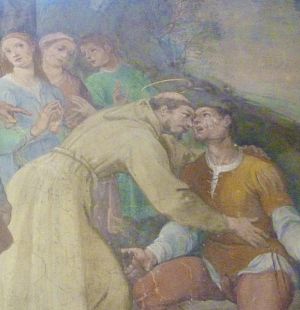

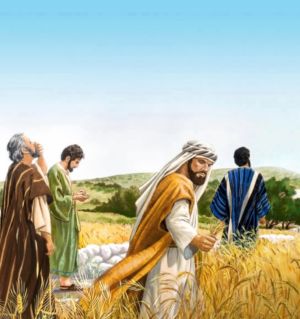
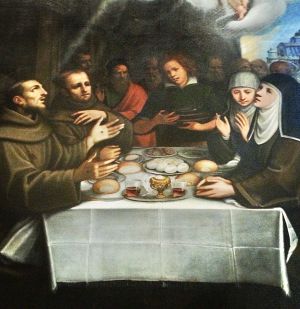
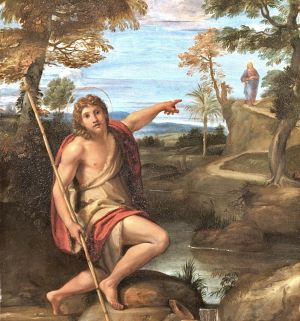
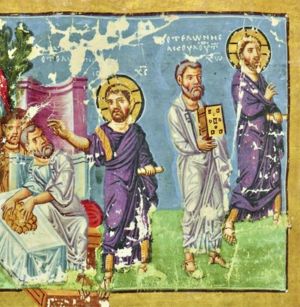
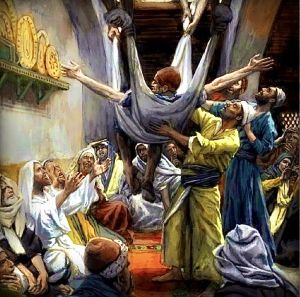
![«There came to him a leper [...] He had compassion on him, stretched out his hand, and touched him»](/media/k2/items/cache/59b909525fb3f114f9eaef8fbc6cce52_Generic.jpg)
